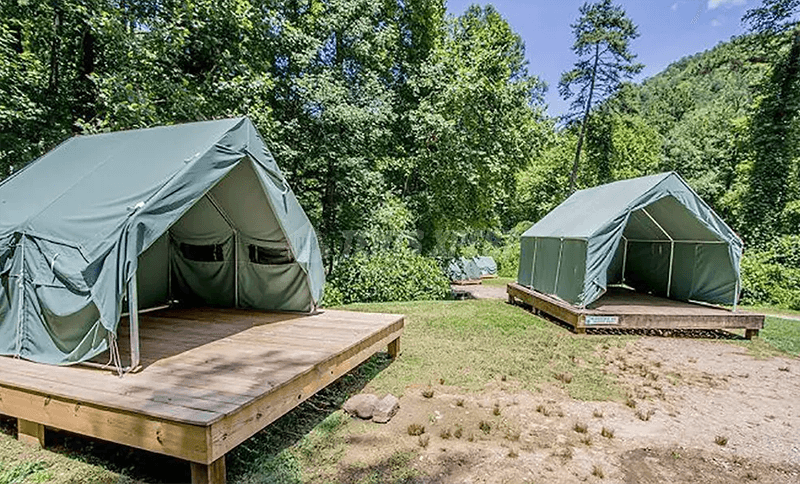Jun. 17, 2022
The benefits of living in a tent full time are amazing. Saving money, feeling happier, challenging yourself, reducing your impact on the world, and making life easier is what many, many people want. It's easy to say you can't do it, but when you look closely at it, tent living becomes a real possibility.
For whatever reason, living in a tent long term can be a challenge. If you plan well enough and mentally prepare in advance, your experience will be much more enjoyable than just surviving.

In my opinion, the best advantage of tent live is the reduced cost of living. Although you may need to buy a lot of supplies to fill the tent. Once you find the right spot to pitch your tent, you'll save a lot on electricity, property taxes, rent, and many other modern amenities. It's much cheaper than living in a house or even an apartment. Even in winter, installing a heater is not too expensive. The overall cost is still well below the monthly payments for gas, rent, internet, and electricity.
Of course, living in a tent might seem extreme and a somewhat harsh way of cutting costs. But if you think about it, you'll find that running a modern home is far more expensive than running a good tent with plenty of supplies or equipment, including winter items.
Studies have been conducted that show that spending a lot of time in the forest (often called forest bathing) can help you become healthier and happier in many important ways. Plants release phytochemicals that can help you breathe in more air, keep your body regulated, and boost your immune system. Some people believe that spending quality time outdoors can also help you be happier. Let's not forget the increase in vitamin D, either.
Our lives today are not only complicated but hurried, thanks to the hustle and bustle that plagues our daily lives, we are surrounded by irrelevant things. However, when you live in a tent, you will only be able to focus on the most important things, leaving the irrelevant stuff behind. With the right perspective on lifestyle, you will be able to adjust your lifestyle and feel a real simplicity that you have never experienced before.
For those who have never had the opportunity to live in a tent before, this can be a life-changing experience. You will spend less on luxuries and more on necessities. The best part of living in a tent is that you will be able to renew your mind and body when you are in touch with nature.
You can get injured while living outdoors, and you must have a first aid kit and life-saving equipment on hand. In the event of an emergency, you'll need more than just these supplies. When an accident or serious illness does occur, a major drawback is that you may be a long way from medical treatment. When things do go wrong, it's a good idea to have a plan.
Depending on your area, wildlife may also be a problem. While most animal attacks are rare, you should consider the risk of being attacked by wildlife when you live outside. Depending on where you live, you may be surrounded by predators that pose a threat to your safety; bears, wolves, and snakes are all creatures you may have to deal with.
When you live in a house, bad weather is no big deal because you can hide inside for hours. Living outdoors is another matter. For many people considering living in a tent, bad weather can be an immediate deterrent, and even if you have the perfect tent, bad weather can be miserable, especially in the winter.
If you plan to live in a tent during the colder months of the year, you will need to have a heat source. A wood-burning stove or a quality propane heater are both good choices.
Yes, sanitation may be an issue if you are staying in a portable tent. Unlike living in a modern house, you won't have access to plumbing or waste removal, which means simple things like showers or going to the bathroom will be more difficult.
A good way to solve this problem is to set up in a campground with public facilities. By paying a fee to set up your tent, you usually have access to shared toilets and showers. This is more convenient because you are not responsible for disposing of your own waste.
If you are choosing to fix a particular place for long-term camping, then consider plumbing your tent for sanitation, which will take care of your daily worries.
Choosing a location is probably the most important thing before you start living in a tent permanently, and it can have a profound impact on the durability and longevity of your gear, as well as your overall well-being and well-being. You need to make sure you're camping in a place that has enough space and a clean, flat surface for you to be comfortable.
Carefully consider weather and climate when choosing a campground, as it can have a huge impact on how comfortable you are living in the wild. Constant rain and wind pose a great threat to those living in tents, and your new home should be sheltered from the wind if possible, but not too shady; this will keep your campsite warm during the day. In temperate regions, choose a campsite that gets more sun to keep you warm. If it's too hot in summer, you can open the tent to let the air circulate.
While there are many places in the world where long-term camping is possible, you need to be fully aware of the legality of camping where you are. Some areas may require you to move on after two weeks or purchase a permit to stay longer. Failure to follow the rules can result in hefty fines, so be sure to do your research.
Hunting and fishing may be a practical method of obtaining food in some areas, but storing food can have its own problems. Without a refrigerator, you need to get creative with food storage. A cooler is an option, but it requires a constant supply of ice, which may not be logically possible.
Some people like to pitch tents by the lake. Being close to a water source definitely has its benefits, as it means you don't need to carry a lot of water with you and can top up when needed. Washing is also much easier when you are near a body of water.
The downside of being close to a lake or river is that you have to walk farther to get to the toilet, and the area can be prone to flooding during heavy rains.
You need to be prepared to invest heavily in gear that will last four seasons and withstand the rigors of camping year round. Here are some things to consider when choosing a year-round tent.
Choose the right tent based on how often you move to your new home. Heavy-duty tents are stronger and offer more protection if you plan to stay in place for extended periods of time. If you're going hiking or backpacking, a lighter tent is better because it's easier to carry and set up.
You will need to choose a tent that can withstand severe weather without worrying about being damaged by the sun, rain or snow. You don't have to worry about constantly tearing or tearing your walls or roof. You need something that lasts a long time.
Most people will choose heavy-duty canvas tents because they are more durable, better suited for winter camping, and provide more protection from the weather. Another significant benefit of canvas tents is that the material is breathable and does not easily accumulate moisture, preventing mold.
Permanent glamping tents are a good option. They can be used as tent houses for permanent residence. Because they are made of stronger materials than traditional tents, they won't break easily. These are specially designed for use in more extreme climates and weather conditions. Since these tents are often used in high-altitude mountain conditions, they also retain heat better.
You should also consider how many people the tent must accommodate, as well as any specific features that are important to your needs. Do you need a large tent for all your long-term needs, or is a small tent enough?
A tent used for full-time living also requires a lot of interior space to move and store your belongings. A tent with no pockets or other place to store your gear can be frustrating and inconvenient when packing up camp. The more features you can find in the right size, the easier it will be to have everything you need.
While living in a tent year-round can present some challenges, if you're interested in living in a tent year-round, it's worth considering how you can get the most comfortable experience.
To make your tent living experience as easy and stress-free as possible, it's important to choose a durable tent and set it up in a good location. Once your tent is set up, you'll want to fill it with the right gear, like cooking supplies, toiletries, and sleeping stuff. Then you can focus on keeping your tent clean and safe.
If you're looking to simplify your life, save money, and escape the fierce competition of modern society, living in a tent full time might be for you.

Chat Now